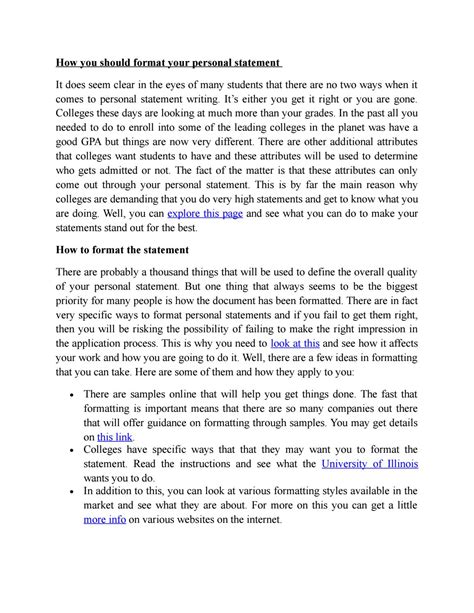Crafting a compelling personal statement is an essential step in the application process for many institutions, including colleges, universities, graduate schools, and scholarship programs. While the specific requirements may vary, one common question that applicants face is the optimal length of their statement. This article aims to provide a comprehensive guide on personal statement length, discussing best practices, common mistakes to avoid, and differences across various institutions and application types.

Best Practices for Personal Statement Length
Undergraduate Admissions:
- 1-2 pages single-spaced or 2-3 pages double-spaced
Graduate School Admissions:
- 2-3 pages single-spaced or 3-4 pages double-spaced
Scholarships and Fellowships:
- 1-2 pages single-spaced or 2-3 pages double-spaced
These recommendations serve as general guidelines and may vary depending on specific instructions provided by the institution or program. It is always advisable to consult the official application requirements to ensure compliance.
Factors to Consider When Determining Length
Personal Statement Purpose:
- The purpose of the personal statement is to showcase your unique experiences, motivations, and aspirations. While brevity is important, you should provide sufficient detail to convey your message effectively.
Application Type:
- Different application types may have varying length requirements. For instance, graduate school applications typically require more extensive statements than undergraduate admissions.
Institution Requirements:
- Institutions may specify specific length limits. Adhering to these guidelines demonstrates respect for the application process and ensures that your statement is given fair consideration.
Common Mistakes to Avoid
Excessive Length:
- Exceeding the recommended length can make your statement seem cluttered and difficult to read. Admissions officers have limited time to review applications, and a lengthy statement may not receive the full attention it deserves.
Insufficient Detail:
- On the other hand, being too brief can hinder your ability to adequately convey your experiences and motivations. Providing specific examples and anecdotes is essential for making a compelling case.
Repetition:
- Avoid repeating information that is already included in other parts of your application, such as your resume or transcript. Focus on providing new insights and perspectives.
Pros and Cons of Different Lengths
| Length | Pros | Cons |
|---|---|---|
| 1 page | Brevity, easy to read | May not provide sufficient detail |
| 2 pages | Balance of length and detail | May be too short for graduate school applications |
| 3 pages | Comprehensive presentation | Can be overwhelming for admissions officers |
Variations in Length Across Institutions
Highly Selective Institutions:
- These institutions may expect more extensive personal statements to ensure they can evaluate the most qualified candidates.
Less Selective Institutions:
- While adhering to general guidelines is still important, less selective institutions may be more flexible with length requirements.
International Applicants:
- International applicants may be required to submit longer personal statements, as they may need to provide additional context about their educational and cultural experiences.
Tips for Creating a Concise and Compelling Personal Statement
- Brainstorm: Generate ideas for potential topics that highlight your unique experiences and strengths.
- Outline: Organize your thoughts into a logical structure, with an introduction, body paragraphs, and conclusion.
- Write: Craft a clear and concise statement that effectively conveys your message.
- Revise and Edit: Carefully review your statement for grammar, spelling, and clarity. Seek feedback from trusted sources to ensure it meets the highest standards.
Conclusion
Determining the optimal length of your personal statement is crucial for presenting your best application. By considering the purpose of the statement, application type, institution requirements, and common mistakes to avoid, you can create a concise yet impactful personal statement that effectively showcases your unique perspectives and aspirations. Remember, the goal is to present a compelling narrative that resonates with admissions officers and helps you stand out from the crowd.
